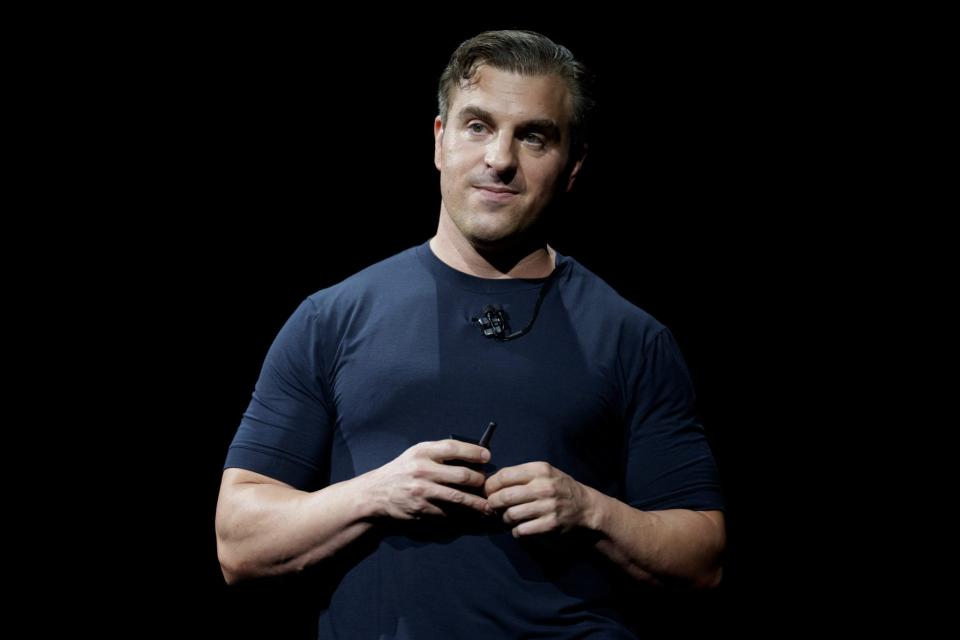Airbnb’s CEO Brian Chesky pairs people up to combat workplace loneliness: ‘Sometimes it’s just hard for one person to be a unicorn’

Staffers at Airbnb might have found themselves in an unofficial work pairing courtesy of a practice adopted by the company's CEO, Brian Chesky.
Chesky, who co-founded the short-term accommodation site in 2008, recently said he has an "informal" habit of pairing people on his team to provide them with another layer of support.
Speaking on the 'ReThinking with Adam Grant' podcast recently Chesky, who is worth $11.8 billion according to the Bloomberg Billionaire's Index, said he will often mold duos out of his new hires.
"Four years ago we hired two creative directors, they worked together as a duo. One's more of a creative director and one's more of a writer," he explained.
"They wanted to join together: I remember him saying: 'Well, if he joins, I'll probably join.' And they came together and they came as a set."
While this working arrangement is common in creative advertising, the concept of a working duo made a mark on Chesky.
"It worked so well that I started thinking about this notion of duos in other areas ... sometimes it's just hard for one person to be a unicorn, to be able to do everything, but if you could create duos they could cover each other's strengths."
Chesky, who is a graduate of the Rhode Island School of Design, was asked the question in relation to combatting workplace loneliness.
While Chesky's practice arose organically, he agreed the tactic could go a long way to helping solve the problem.
According to a November study of more than 2,000 employees from analytics company Perceptyx, more than four in ten employees reported feeling lonely at work.
Men were twice as likely as women to say they felt very lonely, with senior leaders also reporting to feel more chronically isolated than managers lower down the hierarchy.
Perceptyx found that the impact ranged from disengagement to a fall in productivity—lonely workers were 4.5 times more likely to struggle with their output and rely on unhealthy coping mechanisms to get through.
Loneliness isn't just hurting individuals, it's also damaging economies.
Cigna healthcare's Loneliness Index estimates that employers lose $154 billion a year due to absenteeism, a figure that could be improved upon if everyone from trainees to the C-suite felt they had someone to lean on.
Chesky added he had "never really thought about" how this organic habit could help combat the problem of isolation in the workplace, but added: "I think there's something to that.
"And also I think people are on the same journey as you because you're a new employee and you're [trying] to integrate [into] the team, but you're new and you're the odd person out. And so giving people a shared journey to be on together I think is really important."
Work duo, not siblings
While Chesky, who has grown the platform to host more than 1.5 billion guests in its history, previously referred to his employees as "family" he has since walked back that sentiment.
Chesky laid off a quarter of Airbnb's headcount—around 1,900 people—in 2020 at the onset of the pandemic.
While announcing the layoffs, Chesky wrote he had a "deep feeling of love" for all of his staff, which may have rung as something of an oxymoron for those losing their roles.
The CEO of the Fortune500 company has shifted his narrative within the company from familial relationships to close professional bonds.
He explained: "I wrote that letter fairly quickly. I didn't have a lot of time, and so I wrote what I felt and that's what I felt, and I was pretty emotional when I was writing it. And it is true that a company's not a family ... you don't fire members of your family.
"I write what I feel and I felt this sense of protecting people, even people that were leaving, that they weren't totally leaving Airbnb in every sense of the word. I mean, they were leaving with equity, they were leaving with everything on their resume—we created an alumni network.
"We have a very robust alumni network, which is very unusual for a company. There's a bond that's extremely deep."
This story was originally featured on Fortune.com

 Yahoo Finance
Yahoo Finance 